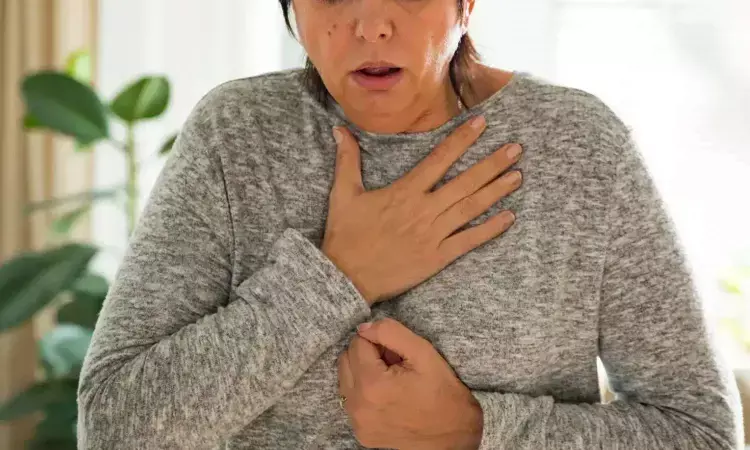- Home
- Medical news & Guidelines
- Anesthesiology
- Cardiology and CTVS
- Critical Care
- Dentistry
- Dermatology
- Diabetes and Endocrinology
- ENT
- Gastroenterology
- Medicine
- Nephrology
- Neurology
- Obstretics-Gynaecology
- Oncology
- Ophthalmology
- Orthopaedics
- Pediatrics-Neonatology
- Psychiatry
- Pulmonology
- Radiology
- Surgery
- Urology
- Laboratory Medicine
- Diet
- Nursing
- Paramedical
- Physiotherapy
- Health news
- Fact Check
- Bone Health Fact Check
- Brain Health Fact Check
- Cancer Related Fact Check
- Child Care Fact Check
- Dental and oral health fact check
- Diabetes and metabolic health fact check
- Diet and Nutrition Fact Check
- Eye and ENT Care Fact Check
- Fitness fact check
- Gut health fact check
- Heart health fact check
- Kidney health fact check
- Medical education fact check
- Men's health fact check
- Respiratory fact check
- Skin and hair care fact check
- Vaccine and Immunization fact check
- Women's health fact check
- AYUSH
- State News
- Andaman and Nicobar Islands
- Andhra Pradesh
- Arunachal Pradesh
- Assam
- Bihar
- Chandigarh
- Chattisgarh
- Dadra and Nagar Haveli
- Daman and Diu
- Delhi
- Goa
- Gujarat
- Haryana
- Himachal Pradesh
- Jammu & Kashmir
- Jharkhand
- Karnataka
- Kerala
- Ladakh
- Lakshadweep
- Madhya Pradesh
- Maharashtra
- Manipur
- Meghalaya
- Mizoram
- Nagaland
- Odisha
- Puducherry
- Punjab
- Rajasthan
- Sikkim
- Tamil Nadu
- Telangana
- Tripura
- Uttar Pradesh
- Uttrakhand
- West Bengal
- Medical Education
- Industry
POCUS tied with good clinical outcomes among patients with acute-onset dyspnoea

Acute care with acute-onset dyspnoea (POCUS) is tied with good clinical outcomes suggests a recent study published in the Internal Emergency Medicine
The early, appropriate management of acute onset dyspnea is important but often challenging. This study aimed to investigate the effects of Point-of-Care Ultrasound (PoCUS) versus conventional management on clinical outcomes in patients with acute onset dyspnea.
The Cochrane Library, MEDLINE, EMBASE and reference lists were searched to identify eligible trials (inception to October 14, 2021). There were no language restrictions. Randomized controlled trials (RCTs), and prospective and retrospective cohort studies that compared PoCUS with conventional diagnostic modalities (controls) in patients with acute onset dyspnea were included.
Two independent reviewers extracted data and assessed the risk of bias. Disagreements were resolved by consensus. The primary study outcomes were time to diagnosis, time to treatment, and length of stay (LOS). Secondary outcomes included rate of appropriate treatment, 30-day re-admission rate, and mortality.
The results:
. They included eight RCTs and six observational studies with a total of 5393 participants. Heterogeneity across studies was variable (from low to considerable), with overall low or moderate study quality and low or moderate risk of bias (except one article with serious risk of bias).
. Time to diagnosis and time to treatment were significantly shorter in the PoCUS group. In-hospital LOS showed no differences between the two groups, but LOS in the Intensive Care Unit was significantly shorter in the PoCUS group.
. Patients in the PoCUS group showed significantly higher odds of receiving appropriate therapy compared to controls but there was no significant effect on 30-day re-admission rate and in-hospital or 30-day mortality.
Thus, results indicate that PoCUS use contributes to early diagnosis and better outcomes compared to conventional methods in patients admitted with acute onset dyspnea.
Reference:
Szabó, G.V., Szigetváry, C., Szabó, L. et al. Point-of-care ultrasound improves clinical outcomes in patients with acute onset dyspnea: a systematic review and meta-analysis. Intern Emerg Med (2022). https://doi.org/10.1007/s11739-022-03126-2
Dr. Shravani Dali has completed her BDS from Pravara institute of medical sciences, loni. Following which she extensively worked in the healthcare sector for 2+ years. She has been actively involved in writing blogs in field of health and wellness. Currently she is pursuing her Masters of public health-health administration from Tata institute of social sciences. She can be contacted at editorial@medicaldialogues.in.
Dr Kamal Kant Kohli-MBBS, DTCD- a chest specialist with more than 30 years of practice and a flair for writing clinical articles, Dr Kamal Kant Kohli joined Medical Dialogues as a Chief Editor of Medical News. Besides writing articles, as an editor, he proofreads and verifies all the medical content published on Medical Dialogues including those coming from journals, studies,medical conferences,guidelines etc. Email: drkohli@medicaldialogues.in. Contact no. 011-43720751


